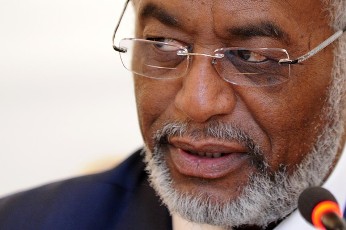Sudan pleas for debt relief & economic assistance from international community
September 14, 2013 (KHARTOUM) – The Sudanese foreign minister Ali Karti has disclosed today that president Omer Hassan al-Bashir, Chairman of the African High Level Implementation Panel (AUHIP) high-level Thabo Mbeki and South Sudan President Salva Kiir signed a letter addressed to the international community regarding financial assistance to support the peace process between the two neighboring states.

Karti said in a statement before departing to Brussels today that Sudan has patiently awaited this letter adding that this presents an opportunity to coordinate diplomatic moves with South Sudan in the coming period particularly since the two countries have received an invitation from the World Bank to participate in its annual meetings next month.
Oil used to be the main source for Sudan’s budget until Southern secession in July 2011, when Khartoum lost 75 percent of its oil production and its status as oil exporter overnight.
As per an agreement sealed with Juba, Khartoum will collect a fee for each barrel of oil exported by South Sudan through the north’s pipeline.
South Sudan will also pay around $3 billion in one lump sum to help support Sudan’s ailing finances.
But analysts say Sudan needs more money to keep its head above water and to make payments on its foreign debt owed.
Sudan’s external debt is estimated to have grown by 27% since 2008 from $32.6 billion to $41.4 billion in 2011. The IMF forecasted the debt level to reach $43.7 billion in 2012 and $45.6 billion in 2013. The latter represents 83% of Sudan’s 2011 GDP, which was $55.1 billion.
Khartoum and Juba are to sort out the issue of dividing the portion of pre-partition external debt each side will carry.
The head of Sudan’s negotiating team on post-secession issues Idris Abdel-Gader stated last March that the two countries agreed to work together to address Sudan’s debt and reach out to donors in a bid to have it written it off within two years.
Abdel-Gader added that if the debt relief was not possible, then the only remaining option is to split the debt between the two countries.
Last April, the deputy director of the Middle East and Central Asia department at the International Monetary Fund (IMF), Edward Gemayel, warned that it will be near impossible for Sudan to secure debt relief even if it satisfied technical and economic requirements.
Gemayel who led a delegation to Khartoum went on to say that Sudan won’t be able to benefit from the Heavily Indebted Poor Countries (HIPC) Initiative despite fulfilling its conditions unless it succeeds in convincing all 55 members of the Paris Club creditor nations whom he said have the power to slash 67% of conventional debt owed by Sudan.
(ST)
